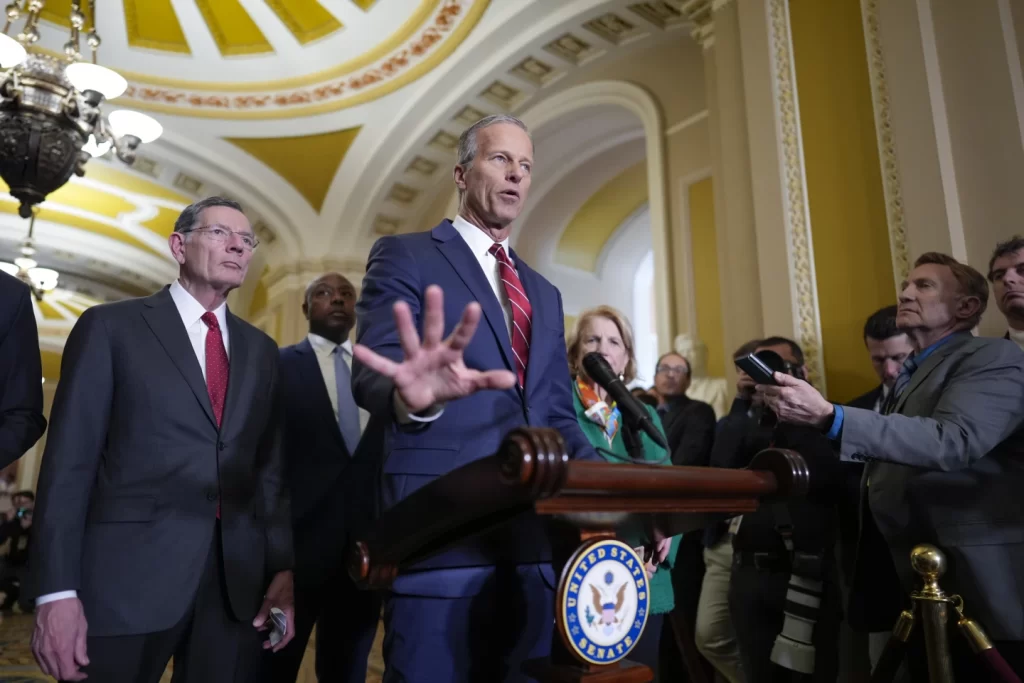
WASHINGTON— Senators were churning through a contentious late night — or all-night — debate Friday over a Republican budget plan that’s central to President Donald Trump’s agenda for trillions of dollars in tax breaks and boosts to border security and defense spending, all while slashing other government spending.
It could not have come at a more difficult political moment. The U.S. economy is churning over Trump’s vast tariff scheme sent stocks plummeting, and experts are warning of soaring costs for consumers at home and threats of a potential recession. Even some Republicans have expressed concerns.
But GOP leaders with a nod from Trump are determined to march ahead, pushing past a hardened line of opposition from Democrats, who are unified against what they decry as tax breaks for the wealthy at the expense of federal programs Americans rely on. Approval, expected by Saturday morning, would pave the way for Republicans in coming months to muscle a tax cut bill through both chambers of Congress, just as they did in Trump’s first term. “Let the voting begin,” said Senate Majority Leader John Thune, R-S.D.
The evening kicked off what’s called vote-a-rama as Democrats are intent on making the effort as politically painful as possible, with votes on dozens of amendments to the package that GOP senators will have to defend before next year’s midterm elections.
Among them were proposals to ban tax breaks for the super-wealthy, end Trump’s tariffs and clip his efforts to shrink the federal government. One, in response to the Trump national security team’s use of Signal, sought to prohibit military officials from using any commercial messaging application to transmit war plans. Most were failing.
Democrats accused Republicans of laying the groundwork for increasing deficits and cutting key safety net programs such as Medicaid and nutritional assistance to help pay for tax cuts they say disproportionately benefit the rich.
“Trump’s policies are a disaster,” said Senate Democratic Leader Chuck Schumer of New York, as is Elon Musk’s Department of Government Efficiency. “Republicans could snuff it out tonight, if they wanted.”
The Republicans frame their work as preventing a tax increase for most American families, arguing that unless Congress acts, the individual and estate tax cuts that Republicans passed in 2017 will expire at the end of this year.
The Senate package tucks in other GOP priorities — including $175 billion to bolster Trump’s mass deportation effort, which is running short of cash, and a similar amount for the Pentagon to build up the military — from an earlier budget effort.
Sen. John Barrasso, the No. 2 ranking GOP senator, said voters gave Republicans a mission and a mandate in November, and the Senate budget plan delivers.
“It fulfills our promises to secure the border, to rebuild our economy and to restore peace through strength,” Barrasso said.
Throughout the day, the debate was generally one-sided, as Democrats were taking full advantage of 25 hours of their available debate time, while Republicans yielded much of theirs in order to get to the all-night voting frenzy. Pizza was wheeled in on a cart, for Republicans. Tacos, for Democrats.
Almost none of the amendments were expected to pass as Republicans use their majority to swat them back, often in rambunctious voice votes. A few proposals, however, such as preserving Medicaid and food stamps from cuts, some did draw GOP support in a sign of potential unrest ahead.
One Republican, Sen. Bill Cassidy of Louisiana, expressed his own misgivings about tax breaks adding to the federal deficits and said he has assurances that Trump officials would seek the cuts elsewhere.
“This vote isn’t taking place in a vacuum,” he said, a nod to the turmoil over Trump’s tariffs.
And Republican Sen. Rand Paul of Kentucky, the lone GOP opponent to the plan so far, questioned the math being used by his colleagues that he said would pile on the debt load. “Something’s fishy,” he said.
The House and Senate take different approaches that will eventually have to be compromised in the weeks, and months, ahead.



